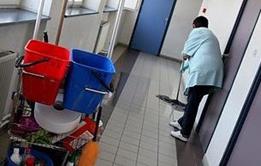A new inquiry by HSJ is highlighting the crucial role of the non-clinical workforce as well as exploring ways in which their contribution can be maximised
When a group of people are defined by what they don’t do it is very likely they will be under-valued and poorly utilised. And so it is with the hundreds of thousands of NHS staff labelled as working in “non-clinical support services.”
This umbrella description of course embraces a huge range of roles and departments; from finance to estates management; facilities to technology; administration to procurement; HR to legal services. However, they are all too often tarred with the same ‘non-essential’ brush – the first to be subject to cuts and the last to be consulted on change.
Lord Carter’s review into NHS efficiency has raised the profile of some non-clinical roles and departments, showing how vital they are to helping the service meet the financial challenges ahead. But the focus is on “unwarranted variation” (“waste” in layman’s language) and once more the contribution of 40 per cent of the NHS’s workforce is discussed in terms of what they are doing wrong and in some cases whether they are needed at all.
NHS politics
No other sector or major employer would be so careless with such a huge section of its workforce – especially if economic circumstance meant that it was often not able to pay competitive salaries (for unlike most clinical staff, their non-clinical colleagues have a choice in who they work for).
There are many plans afoot to merge, outsource, in-house and/or reconfigure the NHS’s “back office”. But too often the focus is simply on cost saving and not on increasing value.
The politics of the NHS – indeed the politics of the country – will mean the NHS’s clinical staff will always grab most of the limelight. There’s no problem with that – as long as their non-clinical colleagues are seen and treated as an essential part of the NHS team.
Maximising their value
HSJ believes that is not always the case – and is trying and do something about it. Our Value in Healthcare Awards and its newly launched Congress already highlight and spread best practice. But we can do more and, so, today we launch the HSJ inquiry into maximising the value of the non-clinical workforce of the NHS. Our aim is to bring this vital part of the workforce to the foreground of the service’s mind.
Specifically, the inquiry will:
- plot the size and scope of the NHS non-clinical workforce, exploring how it has changed and is changing
- capture the current contribution the non-clinical workforce makes
- set out how that contribution might be increased
- campaign to promote the ‘forgotten NHS workforce’
In 2014/15 we worked closely with Serco to deliver the HSJ Commission into the Hospital Care of Frail Older People. The commission’s findings proved to be both prescient and widely accepted. We will work again with Serco on this inquiry – and like the commission its findings will be independent and will pursue no agenda apart from that set out above.
We believe it is time non-clinical NHS staff were brought out of the shadows and had their crucial role recognised
The many smart and progressive clinicians among HSJ’s readership already understand the importance of the work of their non-clinical colleagues. Yet that part of the NHS workforce is strangely under-researched.
To address this imbalance we welcome your contributions of current good practice, as well as your thoughts, views, hopes and fears about how things may change (hsjinquiry@emap.com). Your input will feed directly into the inquiry’s work.
Out of the shadows
Please also be on the lookout for the regional information gathering events we will be holding around the country during the spring and early summer.
We believe it is time non-clinical NHS staff were brought out of the shadows and had their crucial role recognised. We are also steadfast in the view that the NHS will not reach its 70th birthday in 2018 in the best possible health without those staff being given the opportunity to deploy their skills more effectively.
Our inquiry will be committed to helping bring this about and, who knows, we may even discover a better way to describe this essential and integral element of the NHS workforce.
Share your vision for the non-clinical workforce's future

HSJ readers are invited to share their ideas on maximising the contribution of the non-clinical workforce
- 1
 Currently
reading
Currently
reading
It's time to celebrate and study the NHS's non-clinical workforce
- 3































13 Readers' comments